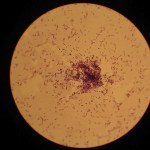microbe
I am very excited to report that the American Physiological Society in partnership with the The Physiological Society held a joint meeting from July 29-31 in Dublin, Ireland. The keynote lectures were given by Dr. Jerry Friedman from Rockefeller University and Dr. W Jon Lederer from the University of Maryland.
Dr. Friedman spoke about his research on obesity and how genetic factors might play a role. In fact, his team was responsible for discovering the obesity (ob) gene in mice in 1994 and identifying the similar gene in humans. The gene encodes the now iconic…
Day 4 of the meeting turned out to be pretty exciting for a comparative physiologist as well.
The first session that I went to was called "RNASEQ approaches to understanding extreme physiological adaptations." Considering the Comparative and Evolutionary Physiology section business and dinner meeting was the night before, I was impressed at my ability to make it to an 8:00am session the following morning.
The first seminar from Dr. Brooke C Harrison (Univ. Colorado, Boulder) was on "Extreme cardiac growth and metabolism in the Burmese python after feeding." He spoke about how the cells…
Wisconsin lawmakers just passed a bill to name Lactobacillus lactis, the bacteria that turns milk into cheese, into its official state microbe! What microbe do you think best represents your state? I think Massachusetts' state microbe should be E. coli, not for the gross make you sick part of course, but because of the importance of the biotech industry to Massachusetts and the importance of the lowly E. coli to biotech. Add your vote for your state microbe in the comments!
Not content with sapping our productivity with the Space Game, Armor Games have released another little science-themed gem in Microbe Kombat. The premise is simple - guide your microbe through the primordial ooze, eat proteins, and engulf smaller microbes. There are two broad strategies: keep eating protein until you're the biggest bully on the block, or keep dividing until you swarm out the enemy. Both have their pros and cons - dividing will make you and your daughter cells more vulnerable to macrophages, but many small microbes will out-compete a single large one in scavenging proteins…
Scientists have discovered new species of iron-breathing microbes that have lived isolated under an Antarctic glacier for millions of years. The microbes are responsible for the landmark blood-red frozen waterfall at Taylor Glacier.
Researchers theorise that the microbes were trapped by the advancing glacier which eventually sealed them inside their habitat. The microbes have persisted in an extreme environment with no light, no oxygen, extreme cold, and high salinity. They are able to survive by liberating iron from the bedrock with the aid of a sulphur catalyst .
The trapped pool is…



